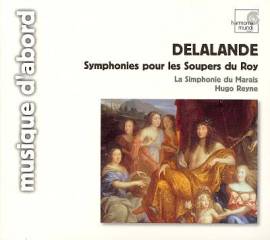De Lalande - Symphonies pour les soupers du roy CD4 (2015)
De Lalande - Symphonies pour les soupers du roy CD4 (2015)

9e Suite, Airs du Ballet de Mélicerte 1 Grand Air 2'04 2 Rondeau, Légèrement 0'59 3 Loure, Doucement 1'58 4 Air Grave, Air des Fleuves, Doucement et Gracieusement 4'21 5 Chaconne 5'16 6 1er Air des Siamois, Pesament 2'27 7 2e Air des Siamois, Pesament, Doucement, La Pagode 1'53 8 Air des Basques, Canarie 0'26 9 Menuet 0'37 10 2e Air, Bourrée 0'32 11 Passepied 0'42 12 Rigaudon - 2e Rigaudon, Trio (alternativement) 1'29 10e Suite 13 Ouverture 2'34 14 Prélude 1'08 15 1er Air, Légèrement 1'10 16 Trio, "Dans ces lieux" 1'05 17 Gigue 1'25 18 Gavotte 0'41 19 2e Air, Gavotte, Rondeau, "C'est l'amour" 0'54 20 La Forlana 1'11 21 Sarabande 0'51 22 Saltarelle 0'32 23 Contredance, Marche 1'13 24 Air, Légèrement 0'52 25 Loure 1'18 26 Chaconne 2'45 11e Suite 27 Ouverture 2'23 28 Trio, "A cette pompe" 1'57 29 Air 1'09 30 Sarabande 2'09 31 Air, Léger 1'03 32 Trio, "Les oiseaux" 1'32 33 Rondeau 1'11 34 Gigue, Légèrement 1'50 35 Symphonie, Trio, "Mais quelle aimable mélodie" 2'54 36 Trio, "Père des jeux" 1'02 37 Trio, Gayement, "Chantons ce héros" 1'48 38 Air, Légèrement 0'49 12e Suite 39 Gracieusement 2'29 40 2e Air mineur 2'05 41 Air vif, presto 1'16 42 Gigue, Gracieusement 2'16 43 Quatuor, Doucement 3'28 44 Prélude 0'24 45 Air vif 1'45 La Simphonie du Marais Hugo Reyne – Conductor
Michel-Richard de Lalande was one of the main composers in France in the decades around 1700. He was educated as a keyboard player but no compositions for organ or harpsichord have survived. He especially made a name for himself as a composer of sacred music, particularly grands motets for soloists, choir and orchestra. His motets were greatly appreciated by King Louis XIV under whose rule he made his career. Shortly before the Sun King's death in 1715 he had collected the main musical positions at the court. No fewer than 77 motets have come down to us and even in the late 18th century they were still considered masterpieces.
Lalande also composed a considerable number of works for the theatre including serenades, ballets and divertissements. This is relevant in regard to the music played on the present disc. The symphonies pour les soupers du roy include a number of pieces which were part of Lalande's theatre music. Some of the airs are instrumental versions of vocal items in those theatre pieces. The word symphonie has nothing to do with the classical term symphony or sinfonia. In France this accorded to an instrumental work of any kind, independent of its function or the size of the performing ensemble.
The symphonies have been preserved in two versions. The first dates from 1703, with additions from 1713 (the so-called Philidor-manuscript); this includes 185 pieces divided into 12 suites, written for performance during the suppers of Louis XIV. The second version comprises two manuscripts from 1727 and 1745 respectively, and consists of around 300 pieces in 18 suites. The 12 suites from the first version are integrated in this second version, but in a different order; extracts from Lalande's ballets are added. The symphonies consist of three different types of music: purely instrumental works such as preludes and trios, dances and pieces taken from ballets. They are scored for one treble instrument and basso continuo; there are no indications in regard to instrumentation. However, the original sources of some of the pieces suggest that in addition to the common strings wind instruments such as recorders, transverse flutes and oboes can be added. They can be used either independently or play colla parte with the violins.
Unfortunately we don't know how many players were involved in the performances that took place during the King's suppers. No pictures have been preserved. Reyne opted for a performance of the treble part with five violins, plus additional wind instruments and in some pieces also percussion. --- Johan van Veen, musicweb-international.com
download (mp3 @320 kbs):
yandex 4shared mega mediafire zalivalka cloudmailru uplea








